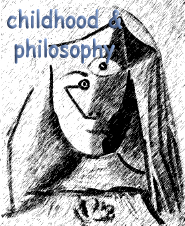ensino a filosofia um olhar a partir da perspectiva do aprender
DOI:
https://doi.org/10.12957/childphilo.2020.52641Keywords:
learning, teaching, philosophy classroom, experience, studyingAbstract
the inquiry into teaching in philosophy entails two different questions, namely: What does it mean to teach? And, what is understood by “philosophy”? The first of these questions constitutes the starting point of this article – product of the research project Balance of the Ways of Teaching Philosophy in Colombia –, specifically regarding the topics of teaching as an area, and the task of teaching. However, the methodological potential of studying the task of teaching from the perspective of learning arose while enquiring into the notions of translation, “plagiarism”, repetition, and creation. What kind of relation brings together teaching with learning and learning with teaching? In other words: How much does learning require from teaching? How much learning can we find in teaching? Can teaching and learning be thought of independently from one another? What happens in a philosophy classroom? In short, what does it mean to think about the relation between philosophy and teaching from the perspective of learning? In this way, as can be observed, positing the question of teaching on the axis of learning situates the discussion within the sphere of experience, and of the exercise and practices of the self. This is a different dimension of teaching from that determined by emulation, explanation, and monologue.
Downloads
References
Cerletti, Alejandro. (2008). La enseñanza de la Filosofía como problema filosófico. Buenos Aires: Libros del Zorzal.
Chevallard, Yves. (1991). Transposición didáctica. Del saber sabio al saber enseñado. Buenos Aires: Aique.
Deleuze, Gilles. (2009). Diferencia y repetición. Buenos Aires: Amorrortu.
Deleuze, Gilles & Parnet, Claire. (2013). Diálogos. Valencia: Pretextos
Espinel, Oscar. (2011). La actividad filosófica según Wittgenstein. Confusiones conceptuales e investigación gramatical. En: Polisemia, No. 12, pp. 102 - 112.
Espinel, Oscar. (2014). Filosofía, prácticas de sí y arte de vivir. En: Revista Fermentario. Nº 8, Vol. 2, pp. 1-16.
Espinel, O. & Pulido Cortés, O. (2017). Enseñanza de la filosofía. Entre experiencia filosófica y ensayo. En: Universitas Philosophica, 34(69), pp. 121-142.
Espinel, O. & Pulido Cortés, O. (2019). Ejercicio filosófico: “esfera” del aprender y el enseñar filosofía. En: Díaz, J. G., &
Espinel, O. (Comp.). Fragmentos. Leer, traducir, dialogar. Bogotá: UNIMINUTO.
Foucault, Michel. (2009). Hermenéutica del sujeto. Buenos Aires: Fondo de Cultura Económica.
Gallo, Silvio. (2016). Deleuze e a Educação. Belo Horizonte: Autêntica Editora
Hadot, P. (1998). ¿Qué es la filosofía antigua? México: Fondo de Cultura Económica.
Hadot, P. (2006). Ejercicios espirituales y filosofía antigua. Madrid: Ediciones Siruela.
Hadot, P. (2007). Wittgenstein y los juegos del lenguaje. Valencia: Pretextos.
Havelock, Erick. (2002). Prefacio a Platón. Madrid: Antonio Machado Libros.
Heidegger, Martin. (2010). ¿Qué significa pensar? Madrid: Editorial Trotta.
Jaeger, W. (2010). Paideia: los ideales de la cultura griega. México: Fondo de Cultura Económica.
Kohan, W. O. (2011). Desafíos para pensar… la enseñanza de la filosofía. Cuestiones de Filosofía, 11. https://doi.org/10.19053/01235095.v0.n11.2009.649
Kohan, Walter. (2016). El maestro inventor. Simón Rodríguez. Caracas: Ediciones del solar.
Larrosa, Jorge. (2003). Entre lenguas. Lenguaje y educación después de Babel. Barcelona: Laertes.
Marrou, H.-I. (2004). Historia de la educación en la antigüedad. México: Fondo de Cultura Económica.
Pulido, O., Espinel, O., Gómez, M. Á., & (Comps.). (2018). Filosofía y Enseñanza. Miradas en Iberoamérica. Tunja: UPTC.
Rancière, Jacques. (2007). El maestro ignorante. Cinco lecciones sobre la emancipación intelectual. Buenos Aíres: Libros el Zorzal
Sloterdijk, P. (2010). En el mundo interior del capital. Para una teoría filosófica de la globalización. Madrid, España: Siruela.
Witgenstein L. (1968). Los Cuadernos Azul y Marrón. Traducción de Francisco Gracia Guillén. Madrid: Tecnos.




